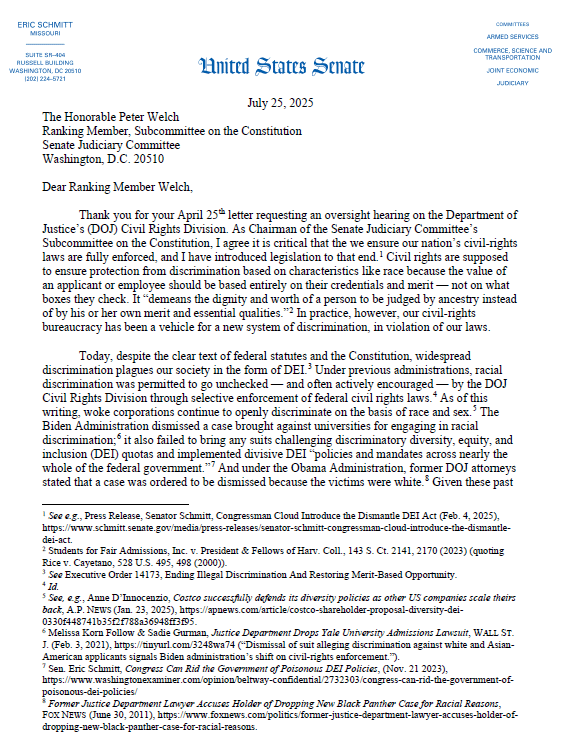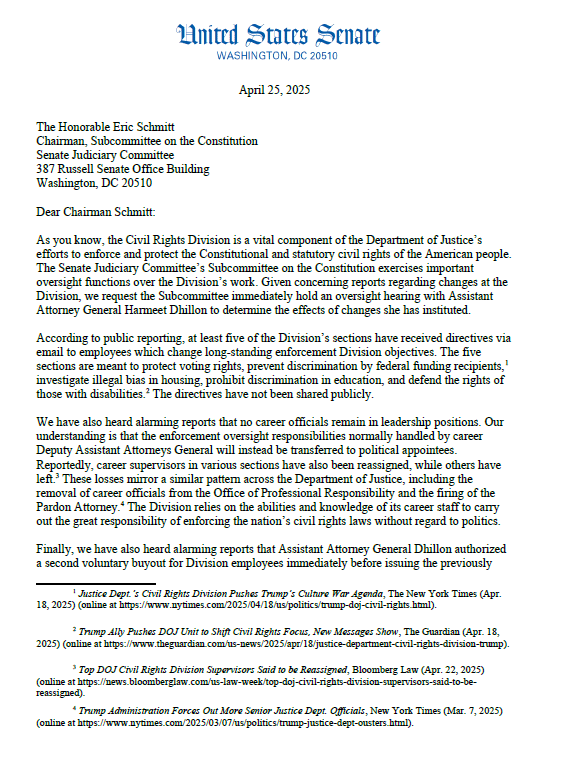Led by liberal judges, a federal court just undermined one of Congress's most powerful tools to rein in the Administrative State.
The court's decision allows unelected bureaucrats in DC to impose rules that Congress and the President expressly rejected.
Let me explain. 🧵
The court's decision allows unelected bureaucrats in DC to impose rules that Congress and the President expressly rejected.
Let me explain. 🧵

Under the Congressional Review Act, Congress can vote to repeal a regulation issued by an administrative agency.
If the President signs that resolution, then the regulation is repealed and the agency cannot create a "substantially similar" regulation.
If the President signs that resolution, then the regulation is repealed and the agency cannot create a "substantially similar" regulation.
https://x.com/jadler1969/status/1955782560174485933
That's why I've championed using the CRA to repeal dozens of harmful Biden-era regulations and make sure they don't come back.
For example, Congress and President Trump repealed a series of Biden-Dep't of Energy regs that hurt American energy dominance.
For example, Congress and President Trump repealed a series of Biden-Dep't of Energy regs that hurt American energy dominance.
https://x.com/ceidotorg/status/1955703154835681323
So what happened in this federal appeals court case?
The story starts in 2017 when President Trump and congressional Republicans used the CRA to repeal Obama-era regulations--saving billions of $$ in regulatory costs and millions of paperwork-hours.
americanactionforum.org/insight/update…
The story starts in 2017 when President Trump and congressional Republicans used the CRA to repeal Obama-era regulations--saving billions of $$ in regulatory costs and millions of paperwork-hours.
americanactionforum.org/insight/update…
One of the rules they repealed was from the FCC.
But the unelected bureaucrats at the FCC weren't happy that their regulation had been repealed by your elected representatives and President Trump.
So they waited until Biden took office and then tried again.
But the unelected bureaucrats at the FCC weren't happy that their regulation had been repealed by your elected representatives and President Trump.
So they waited until Biden took office and then tried again.
Companies affected by the new rule sued, arguing it was illegal for the FCC to re-impose the same rules that Congress and the President repealed using the CRA.
And they were right to do so. The FCC rule blatantly violated the law.
And they were right to do so. The FCC rule blatantly violated the law.
But two 6th Circuit appeals court judges (an Obama appointee and a Biden appointee) upheld the rule.
They said the new rule wasn't "substantially the same" as the repealed rule because the new rule covered only SOME of the issues that the old rule did.
Let's break that down.
They said the new rule wasn't "substantially the same" as the repealed rule because the new rule covered only SOME of the issues that the old rule did.
Let's break that down.
Under the court's logic, the repealed rule and the new rule were not "substantially the same" because the repealed rule covered subjects A+B while the new rule only covered A.
A simple example shows the absurdity of the court's reasoning.
A simple example shows the absurdity of the court's reasoning.
Imagine a mother tells her son: "You are not allowed to stay out past 11pm with your friends."
If the son then stays out past midnight, but does so alone, has the child broken his mother's command?
Common sense and basic logic both say yes. But the court's logic says no.
If the son then stays out past midnight, but does so alone, has the child broken his mother's command?
Common sense and basic logic both say yes. But the court's logic says no.
Here, Congress and the President said to the FCC: "You are not allowed to regulate A+B."
So the Biden FCC—like the disobedient child in our example—tried to be clever and tried to regulate just A.
And the court just let them get away with it. Absurd.
So the Biden FCC—like the disobedient child in our example—tried to be clever and tried to regulate just A.
And the court just let them get away with it. Absurd.
https://x.com/VolokhC/status/1955782639379529858
The 6th Circuit should take this case en banc and reverse this faulty opinion.
And if they don't, then SCOTUS must take the case and restore the full force of the CRA according to the plain meaning of its text. Our separation of powers demands it.
And if they don't, then SCOTUS must take the case and restore the full force of the CRA according to the plain meaning of its text. Our separation of powers demands it.
The CRA is in need of an overhaul.
https://x.com/PacificLegal/status/1948068838064496787
Congress is paying attention too.
After SCOTUS overturned Chevron, I led a Working Group exploring how Congress can best use that decision to rein in the Administrative State and restore our separation of powers.
For more on the CRA—check out the report.
journals.law.harvard.edu/jlpp/post-chev…
After SCOTUS overturned Chevron, I led a Working Group exploring how Congress can best use that decision to rein in the Administrative State and restore our separation of powers.
For more on the CRA—check out the report.
journals.law.harvard.edu/jlpp/post-chev…
• • •
Missing some Tweet in this thread? You can try to
force a refresh














